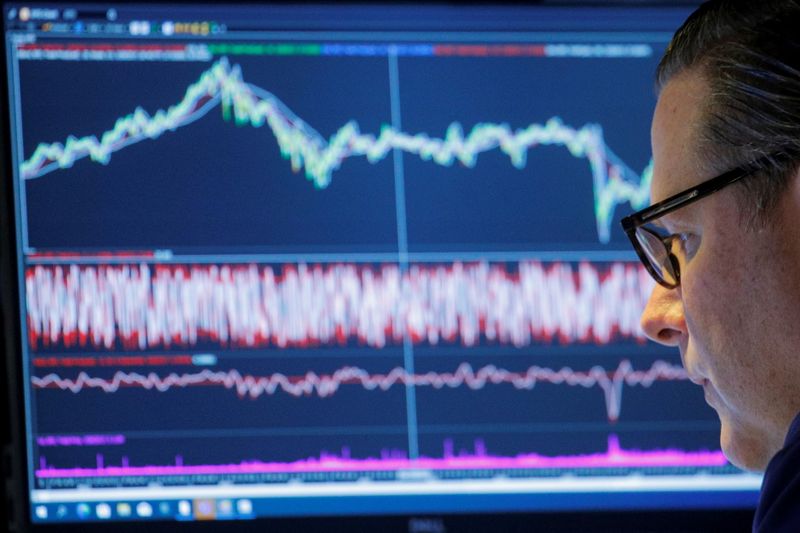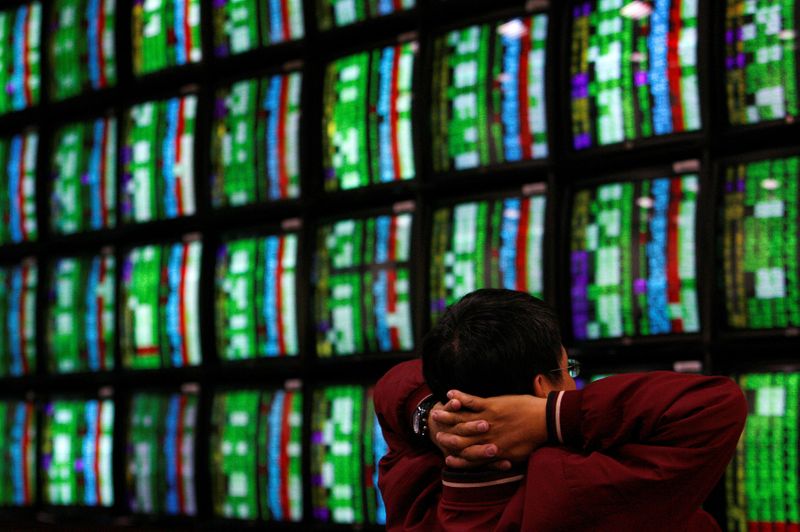By Herbert Lash and Pete Schroeder
NEW YORK/WASHINGTON (Reuters) - European stocks notched record closing highs on Wednesday but Wall Street ended the day lower on worries that rising inflation could push the U.S. Federal Reserve to raise interest rates sooner than expected, an outlook that boosted gold.
All three major U.S. indices ended the day lower, as investors processed whether strong consumer activity in the face of rising inflation could spur the Fed to ease back on stimulus faster than once thought.
The Dow Jones Industrial Average fell 0.58%, the S&P 500 lost 0.26% and the Nasdaq Composite dropped 0.33%.
The MSCI world equity index, which tracks shares in 45 nations, fell 0.29%.
Soaring gasoline prices in Europe added to inflation fears, but strong earnings reports helped push Germany's DAX, the French CAC 40 and the pan-European STOXX 600 to fresh closing records.
The dollar eased from a fresh 16-month high, while the euro remained a little soft as investors weighed the odds of central bank tightening, which could slow growth, amid rising price pressures.
Concerns that the Fed may mishandle inflation are overblown as the U.S. central bank has clearly signaled how it will reduce its bond-buying without destabilizing the market, said David Bahnsen, chief investment officer at wealth manager The Bahnsen Group in Newport Beach, California.
"I simply do not believe the market ultimately expects a policy mistake that drives out some of the liquidity that has helped these markets," Bahnsen said.
The dollar index, which tracks the greenback versus a basket of six currencies, fell 0.15% to 95.795.
The euro eased 0.05% to $1.1313, while the yen fell 0.62% to $114.1100.
Investors think higher inflation could encourage the Fed to accelerate the tapering of its asset purchase program.
The Fed began phasing out its bond-buying this month and expects to end purchases altogether by mid-2022.
Inflation worries pushed investors to safe-haven gold. U.S. gold futures settled up 0.9% at $1,870.20 an ounce.
$1 TRILLION INFLOWS
Global equities have seen inflows of about $1 trillion in the past 51 weeks as positive news on coronavirus vaccines emerged, Goldman Sachs (NYSE:GS) said in a note, adding this year has already seen four times the inflows of the previous best year.
Oil prices slumped after the Organization of Petroleum Exporting Countries and the International Energy Agency warned of impending oversupply and that rising COVID-19 cases in Europe increased the downside risks to demand recovery.
The two major crude benchmarks fell to their lowest closing levels since early October.
Brent crude fell $2.15 to settle at $80.28 a barrel. U.S. crude settled down $2.40 at $78.36 a barrel.

U.S. Treasuries rallied as a recent backup in yields reached levels that lured buyers back into the securities and after the Treasury sold 20-year bonds to tepid, but not terrible demand.
Benchmark 10-year yields reached 1.65%, the highest since Oct. 26, before retreating and falling back to 1.59%. They have increased from a low of 1.42% last week, before data showed that U.S. consumer prices posted their biggest gain in 31 years in October.
